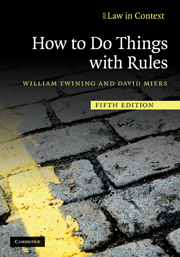Book contents
- Frontmatter
- Contents
- Preface
- Online appendices
- Acknowledgements
- Abbreviations
- Table of statutes and legislative instruments
- Table of cases
- Part I
- Part II Reading, using and interpreting rules in general
- 2 Problems and mischiefs
- 3 Of rules in general
- 4 Interpretation and application
- 5 Imperfect rules
- Part III Reading law: reading, using and interpreting legislation and cases
- Part IV
- Index
- Resources on the web
- References
3 - Of rules in general
Published online by Cambridge University Press: 05 June 2012
- Frontmatter
- Contents
- Preface
- Online appendices
- Acknowledgements
- Abbreviations
- Table of statutes and legislative instruments
- Table of cases
- Part I
- Part II Reading, using and interpreting rules in general
- 2 Problems and mischiefs
- 3 Of rules in general
- 4 Interpretation and application
- 5 Imperfect rules
- Part III Reading law: reading, using and interpreting legislation and cases
- Part IV
- Index
- Resources on the web
- References
Summary
In this chapter we introduce some of the more important general considerations relevant to understanding the nature of rules. After examining the concept of ‘rule’ and its relation to such notions as principles, policies and values, we consider briefly some standard distinctions concerning the form and structure of rules, and the difference between general exceptions and exemptions in particular cases. We then deal in turn with the variety of rules and the relations between rules within a single aggregation or ‘system’, between different systems of rules, and between systems of rules and external factors. Next we consider in an elementary way some general theories about the functions of rules, rules as techniques of social management, and differences between instrumentalist, formalist and other perspectives on rules, with particular reference to the notion of rules as instruments of power. The purpose of this chapter, then, is to provide a fairly simple theoretical basis from which to proceed to explore what is involved in the interpretation of rules.
What is a rule?
In ordinary talk the word ‘rule’ has many usages. In the present context we are not concerned with ‘rule’ in the sense of reign, e.g. the rule of Queen Victoria, or in the sense of a habit or empirical generality, as in ‘as a rule he catches the 9.55 train to London’, or in the sense of a calculating instrument, such as a slide rule.
Information
- Type
- Chapter
- Information
- How to Do Things with Rules , pp. 80 - 120Publisher: Cambridge University PressPrint publication year: 2010
